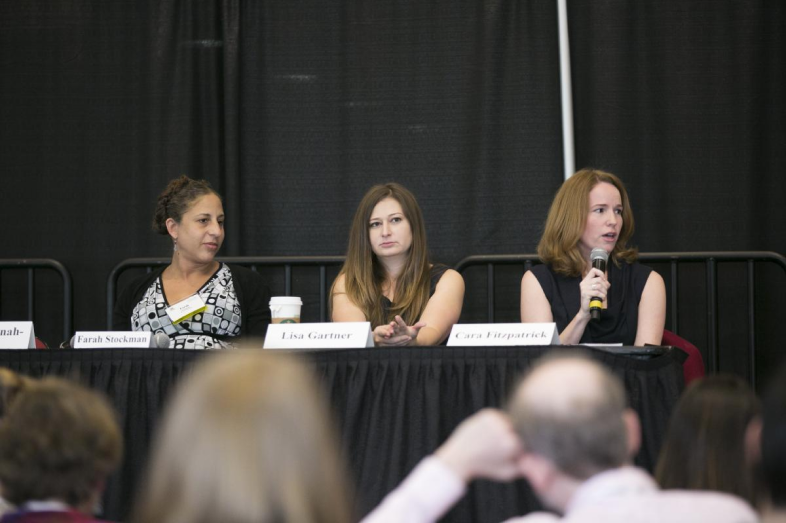

After an unarmed Michael Brown was fatally shot by a white police officer in Ferguson, Missouri, reporter Nikole Hannah-Jones watched events unfold from afar. But she was struck when the 18-year-old’s mother, standing at the edge of the crime scene where her son’s dead body lay, asked if the authorities knew how hard it is to get a black boy to graduate from high school.
“Five minutes on Google and I knew that I was going to go down there,” Hannah-Jones said during an Education Writers Association panel on school segregation last month. “He had graduated with a worthless, unaccredited diploma, and the college he was headed to was a for-profit trade school that had been penalized by the Obama administration for being predatory and for producing worthless degrees. This was the future that was set up for him.”
Hannah-Jones ended up co-reporting a series on school desegregation for This American Life that won a Peabody Award. (She also won an EWA award for this coverage.) On the panel, Hannah-Jones joined Farah Stockman, who won a Pulitzer Prize for a series of columns in The Boston Globe on busing’s effects in that city, and Cara Fitzpatrick and Lisa Gartner of the Tampa Bay Times. They won a Pulitzer this year – as well as an EWA award — for a series about school segregation in Pinellas County, Florida.
‘It Was Incomprehensible’
All the panelists said they didn’t start out intending to write series about school desegregation.
The seed for Stockman’s columns was planted when Boston’s city council voted on a symbolic resolution to celebrate the 60th anniversary of the landmark Brown v. Board of Education ruling by the U.S. Supreme Court, which struck down the principle of “separate but equal education.” Three city council members, all from areas that strongly opposed busing, voted “present” instead of “yes.”
“It was incomprehensible to me,” Stockman said. “We wrote an editorial slamming them, talking about how crazy that was.”
In response, one of the city councilmen called Stockman. He admitted he was wrong to vote against the resolution, but maintained his opposition to busing. Then he told his story: In response to busing, every black family in East Boston was firebombed, he said. Black and Latino families were also targeted in, and fled, other neighborhoods, such as Charleston and Southie. The story of that social unrest had never been told.
“It was a hell the city had to go through to get to a better place, but we did pay a price for it as far as racial issues were concerned,” Stockman said. “For years, there was a lot of resentment and animosity because these communities had thought of themselves as Irish and Italian and all of a sudden they’re being told they’re white and a federal judge is going to tell them where they’re going to send their children to school.”
Promises Unfulfilled
The series by Fitzpatrick and Gartner for the Tampa Bay Times was born out of disturbing trends in data that the two noticed. Looking at test scores over time, Fitzpatrick saw an achievement gap of alarming magnitude between black and white students, especially given her time in Broward and Palm Beach counties, where smaller gaps were addressed as crises.
“I get to Pinellas County, where the African-American students were doing far worse than most others in Florida, and there was no discussion of it at all,” Fitzpatrick said.
Looking for causes, the team zeroed in on a 2007 school board vote to abandon integration. In the years after that vote, scores plummeted and teacher turnover skyrocketed in five majority-black elementary schools. The campuses also encountered more violent incidents than all the county’s high schools combined.
The panelists all offered tips to reporters tackling the hot-button issue of segregation.
“When we write about segregation, we can give the least agency to children,” Hannah-Jones said. “We give them the least voice. We are almost always talking to and about adults and very seldom giving children the opportunity to talk about how it affects them.”
Stockman said she learned that placing the burden entirely on schools to fix the problem of segregation can be unfair.
“Schools are asked to do so much,” she said. “They’re asked to level the playing field in our society when really housing is a big part of it. Why are our neighborhoods so segregated? Why are we telling black kids that you have to be bused out of your community into a white community to get a good education?”
Fitzpatrick and Gartner talked about using data to show the problems caused by resegregation. The newspaper’s data analyst helped the reporters reveal that black students were being punished more severely than white students for subjective offenses in school such as “defiance,” and that more than 100 teachers with at least 10 years of experience left the five schools for nearby schools in the years after the pivotal board vote.
The school district promised to take certain steps, such as recruit high-performing teachers to the neediest schools, but never did them, Gartner said.
“They talked about pouring extra money into these schools and then actually it was less,” she said. “It was just a failure to fulfill their promises.”